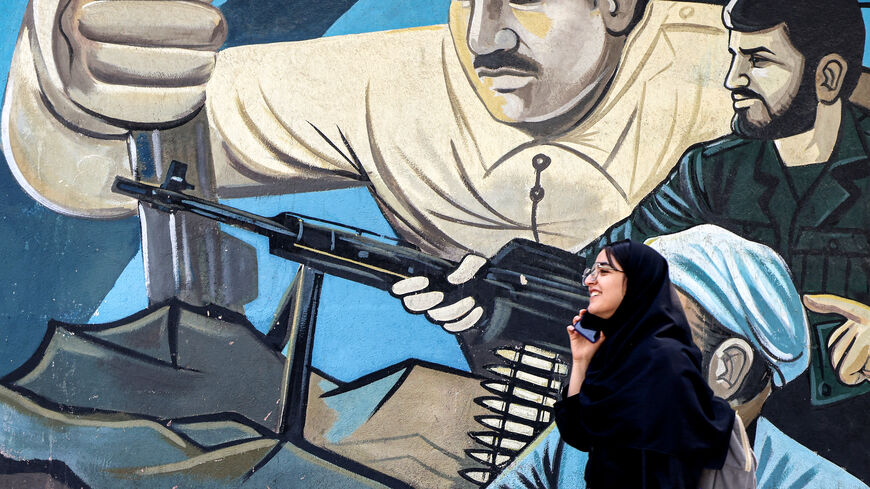Iran vows it will respond 'within seconds' if Israel retaliates
The latest Iranian attack on Israel in response to a suspected Israeli strike against Iran’s consulate in Syria has set off fears of a full-blown war in the region.

A slew of threats are coming out of Iran against any Israeli response to the Iranian attack against the Jewish state over the weekend, amid an escalating war of words between Israel and Iran that threatens to snowball into a full-blown war in the already tense region.
Iran's Islamic Revolutionary Guard Corps (IRGC) launched an unprecedented attack on Israel on Saturday, firing hundreds of drones and missiles, in retaliation for the suspected Israeli strike on its consulate in Damascus earlier this month, which killed at least seven people, including two IRGC commanders.
While Israel says most of the drones and missiles were intercepted, the incident marks the first direct attack by Iran on Israeli territory, raising concerns of a much-wider regional conflict.
Israel's military Chief of Staff Lt. Gen. Herzi Halevi vowed a response and said Iran will face the “consequences” of its actions.
Iran was quick to respond to the Israeli threats.
In a phone call with Qatar’s Emir Sheikh Tamim bin Hamad Al Thani late on Monday, Iranian President Ebrahim Raisi stressed that his country will respond to any Israeli attack.
“We firmly declare that the smallest action against Iran's interests will certainly be met with a severe, widespread and painful response against all its perpetrators,” Raisi said, according to a statement carried by the state-run IRNA news agency.
Commenting on the weekend strikes, Raisi reiterated his country’s legitimate right to self-defense, describing the alleged Israeli attack on the Iranian Consulate in Syria as a “desperate move” in light of Israel’s “failure” to achieve its goals in the Gaza Strip.
'Within seconds'
Echoing similar threats, Iran's Deputy Foreign Minister Ali Bagheri Kani said on Monday that Tehran will respond to any Israeli retaliation “within seconds.”
“If the Zionist regime is rational enough, it will not repeat such a mistake because Iran will give a harder, faster and more urgent blow,” Kani was quoted by IRNA as saying.
Earlier that day, Iranian Foreign Ministry spokesperson Nasser Kanaani told reporters in Tehran that while Iran is not seeking to escalate tensions in the region, “it will act more resolutely than before to deter and punish the aggressor for any illegitimate or irrational actions if Iran’s red lines are crossed.”
The weekend attack and ensuing threats have set off fears of a direct military confrontation between Israel and Iran, which had been so far limited in scope. Since the Israel-Hamas war in the Gaza Strip erupted in October, Iran’s proxies, including the Lebanese Hezbollah and Yemen’s Houthi rebels, have been leading attacks against Israel and Israeli and US interests in the region in support of the Palestinian Hamas movement.
An all-out war between Israel and Iran that could engulf the whole Middle East prompted international calls for restraint.
Regional diplomacy
In the days following the Iranian attack on Israel, Iran’s Foreign Minister Hossein Amir-Abdollahian received a series of phone calls by regional and international leaders, including his counterparts in Syria, Egypt and Turkey, as well as China and European Union foreign policy chief Josep Borrell, to discuss the latest developments.
In separate posts on the X platform, Abdollahian said he informed the officials about Iran’s right to self-defense in accordance with Article 51 of the United Nations Charter.
“I made it clear that Iran will confront any new evil act from the Israeli regime decisively to defend its security and national interests,” he added in a Sunday post.
An unnamed source revealed to the semi-official Tasnim news agency that Abdollahian asked his Egyptian counterpart, Sameh Shoukry, during their phone call, to send a warning to Israel — without adding more details.
According to the same source, the Iranian top diplomat also sent a message to Washington, via Egypt, warning that Iran will strike US interests in the region if it supports Israel’s actions.
Meanwhile, International Atomic Energy Agency (IAEA) Director General Rafael Grossi expressed concerns on Monday about Israel possibly targeting Iran’s nuclear facilities. He told reporters at the United Nations in New York that Iranian authorities temporarily closed their nuclear facilities on Sunday over “security considerations.”
Taking threats up a notch, Abolfazl Amouei, spokesperson for the Iranian Islamic Parliament’s National Security Committee, warned on Monday that Tehran would resort to weapons never used before in its retaliation to any Israeli attack.
“We have plans for all scenarios and we call on the Zionists to act rationally,” Amouei warned, while speaking to the Hezbollah-affiliated Al-Mayadeen channel.
For his part, the Iranian armed forces’ chief spokesperson issued a stern warning against Western countries over their support to Israel. IRNA cited Brig. Gen. Abolfazl Shekarchi as saying that Iran will “cut the foot of any aggressor” that launches an attack against Iranian territory.
“We remind the heads of state of the United States, the United Kingdom, France and Germany to stop supporting the declining child-killing terrorist regime of Israel,” he said.








